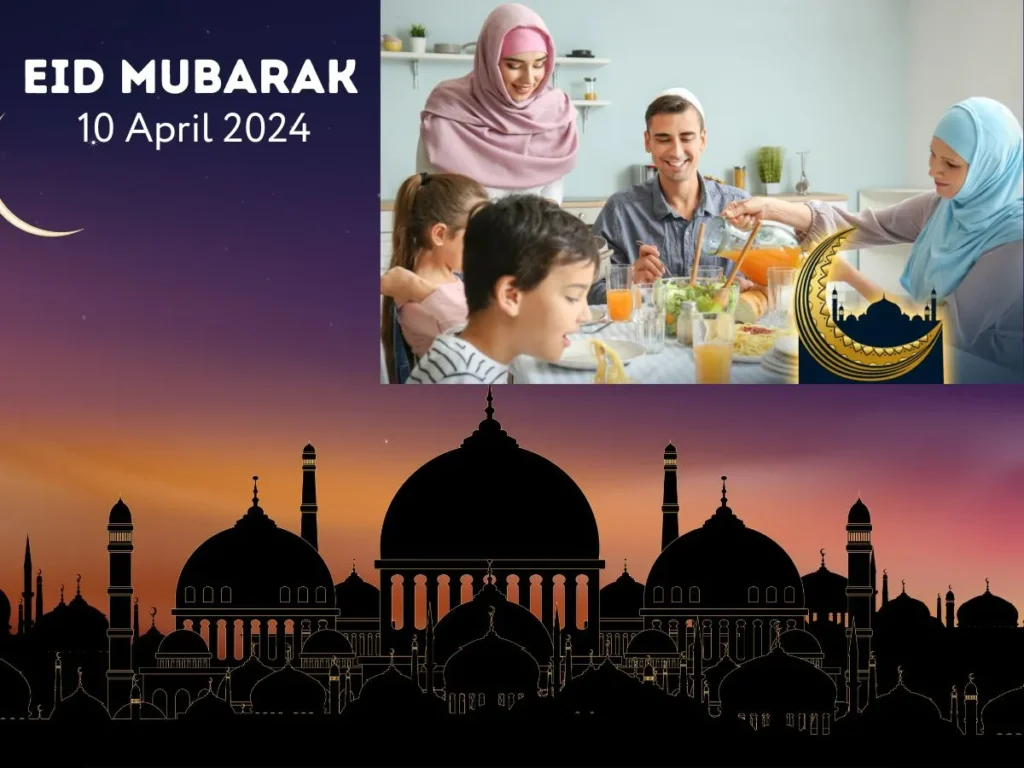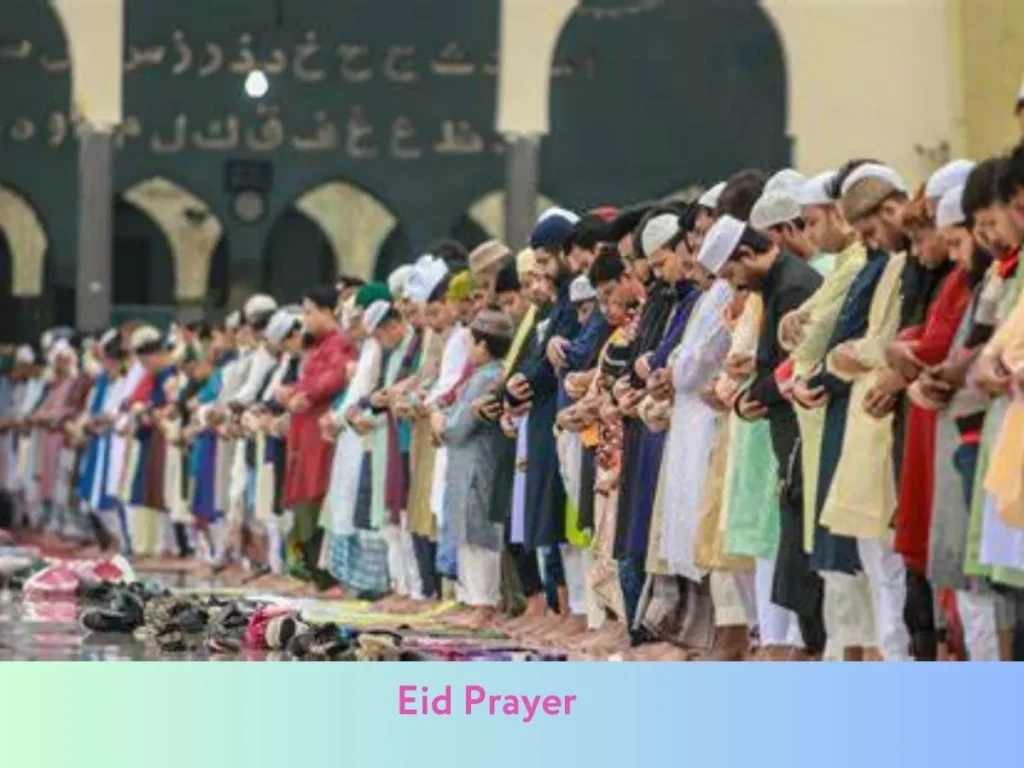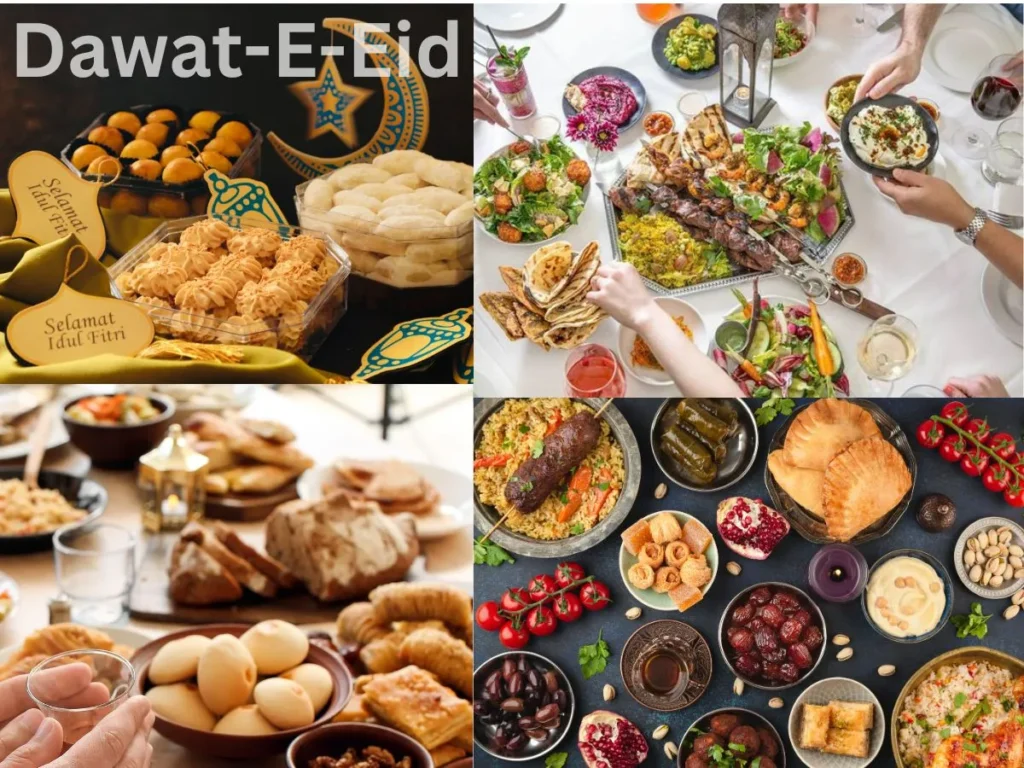Table of Contents
ToggleEid-ul-Fitr: A Celebration of Faith and Culture
Eid-ul-Fitr, a sacred festival of Muslims will be observed in India on 10th April this year, after a month’s long fasting and prayers.
Muslims in India, a diverse community representing various cultures and traditions, celebrate a multitude of festivals throughout the year. These festivals not only hold religious significance but also reflect the rich cultural heritage of India. In this article, we delve into some of the prominent festivals celebrated by Muslims across the country.

Eid-ul-Fitr: The Festival of Breaking the Fast
Origins and Significance
Eid-ul-Fitr marks the end of Ramadan, the holy month of fasting observed by Muslims worldwide. It is celebrated with immense joy and gratitude.
Traditions and Customs
Families come together to offer prayers at mosques and indulge in festive feasts. It’s also customary to give alms to the less fortunate, known as Zakat al-Fitr.
Eid-ul-Adha: The Festival of Sacrifice
Historical Background
Eid-ul-Adha commemorates the willingness of Prophet Ibrahim to sacrifice his son as an act of obedience to God’s command.
Rituals and Observances
Muslims perform the Eid prayers and sacrifice animals, typically sheep, goats, or camels. The meat is then distributed among family, friends, and the needy.
Muharram: The Islamic New Year
Symbolism and Importance
Muharram marks the beginning of the Islamic lunar calendar and holds significant historical and religious importance.
Commemoration and Mourning
The Shia Muslim community commemorates the martyrdom of Imam Hussain, the grandson of Prophet Muhammad, through processions and recitations of elegies.
Milad-un-Nabi: Celebrating the Birth of the Prophet
Joyous Occasion
Milad-un-Nabi celebrates the birth anniversary of Prophet Muhammad, observed with prayers, sermons, and gatherings.
Cultural Practices
Muslims decorate mosques and homes, engage in charity, and participate in communal meals to honor the Prophet’s teachings.
Ramadan: The Month of Fasting
Spiritual Journey
Ramadan is a month of fasting, prayer, reflection, and community bonding for Muslims worldwide.
Observances and Traditions
Muslims fast from dawn to sunset, abstaining from food, drink, and worldly desires. It’s a time for self-discipline, spiritual growth, and compassion towards others.
Urs Festivals: Honoring Sufi Saints
Sufi Influence
Urs festivals commemorate the death anniversaries of Sufi saints and are marked by spiritual gatherings and devotional music.
Unity and Devotion
People from all faiths participate in Urs festivals, emphasizing the message of love, peace, and unity propagated by Sufism.
The festivals of Muslims in India are not just religious observances but vibrant celebrations that unite communities and showcase the country’s cultural diversity. From Eid-ul-Fitr’s festive feasts to Muharram’s solemn processions, each festival carries its own significance, enriching the tapestry of Indian culture. We will learn about one of these important festivals “Eid-ul-Fitr” some calls it “Meethi Eid” (Sweet Eid).

Understanding Eid-ul-Fitr: The Festival of Breaking the Fast
Eid-ul-Fitr, also known as the “Festival of Breaking the Fast,” is one of the most significant festivals celebrated by Muslims worldwide. It marks the end of Ramadan, the holy month of fasting, and is a joyous occasion filled with prayers, feasting, and charitable acts. In this article, we delve into the historical origins, cultural significance, traditions, and customs associated with Eid-ul-Fitr.
Historical Origins
The roots of Eid-ul-Fitr trace back to the time of the Prophet Muhammad in the 7th century CE. The festival was established in the second year of the Islamic calendar, following the migration of the Prophet from Mecca to Medina. According to Islamic tradition, the Angel Gabriel revealed the verses of the Quran to Prophet Muhammad during the month of Ramadan, making it a sacred period of reflection, devotion, and self-discipline for Muslims.
Significance of Eid-ul-Fitr
Eid-ul-Fitr holds immense religious and cultural significance for Muslims around the world. It symbolizes the culmination of a month-long period of fasting, prayer, and spiritual rejuvenation. The festival serves as a reminder of the importance of self-discipline, empathy, and compassion towards others, especially the less fortunate.
Observance of Ramadan
Before delving into the festivities of Eid-ul-Fitr, it’s essential to understand the significance of Ramadan. Muslims observe fasting from dawn to sunset throughout the month, abstaining from food, drink, smoking, and other worldly desires. Ramadan is not only a time for physical detoxification but also a spiritual journey focused on self-reflection, prayer, and charitable deeds.

Rituals and Customs
Shawwal Moon Sighting
The celebration of Eid-ul-Fitr begins with the sighting of the Shawwal moon, which marks the end of Ramadan. In many countries, religious authorities or committees are responsible for officially declaring the beginning of Eid after confirming the sighting of the moon.
Takbir and Eid Prayers
On the morning of Eid-ul-Fitr, Muslims gather at mosques or designated prayer grounds to perform special prayers known as Salat al-Eid. These prayers, also called the Eid prayers, consist of two units of prayer and are offered in congregation. Before the prayers, Muslims recite the Takbir, glorifying Allah and expressing gratitude for the blessings of Ramadan.
Zakat al-Fitr: Charity and Almsgiving
Zakat al-Fitr, also known as Fitrana, is a mandatory charitable contribution that Muslims are required to give before performing the Eid prayers. It is meant to purify one’s wealth and ensure that everyone can partake in the festivities. The amount of Zakat al-Fitr is typically equivalent to the cost of one meal or its value in cash and is distributed to the needy before Eid prayers.
Festive Feasting and Hospitality
Eid-ul-Fitr is a time for families and friends to come together and celebrate with joyous feasts and gatherings. Special dishes and delicacies are prepared, including traditional sweets like baklava, sheer khurma, and ma’amoul. Hospitality is a central theme of Eid-ul-Fitr, with people opening their homes to guests and exchanging gifts as a gesture of goodwill and friendship.
Eid Greetings and Celebrations
After the Eid prayers, Muslims exchange heartfelt greetings of “Eid Mubarak” or “Happy Eid” with each other, embracing and spreading joy and blessings. Children often receive gifts, money, or sweets, known as “Eidi,” from elders as a token of love and appreciation. The festivities continue throughout the day, with families visiting relatives, sharing meals, and enjoying recreational activities together.
Cultural Variations and Traditions
While the essence of Eid-ul-Fitr remains the same across different regions, there are variations in customs and traditions based on cultural influences and local practices. In countries like India, Pakistan, Bangladesh, and other parts of South Asia, Eid-ul-Fitr is celebrated with great fervor and includes unique rituals such as applying mehndi (henna) designs, wearing new clothes, and decorating homes with colorful lights and banners.
Conclusion
Eid-ul-Fitr is much more than just a religious festival; it is a celebration of faith, unity, and community spirit. It encapsulates the values of compassion, generosity, and gratitude, reminding Muslims of their obligations towards God and humanity. As the crescent moon heralds the end of Ramadan and the beginning of Eid-ul-Fitr, Muslims around the world come together to rejoice in the blessings of friendship, family, and faith.
Please send your query/suggestion on this article to aksinhalko@gmail.com